Roberts A.D. The Cambridge History of Africa, Volume 7: from 1905 to 1940
Подождите немного. Документ загружается.

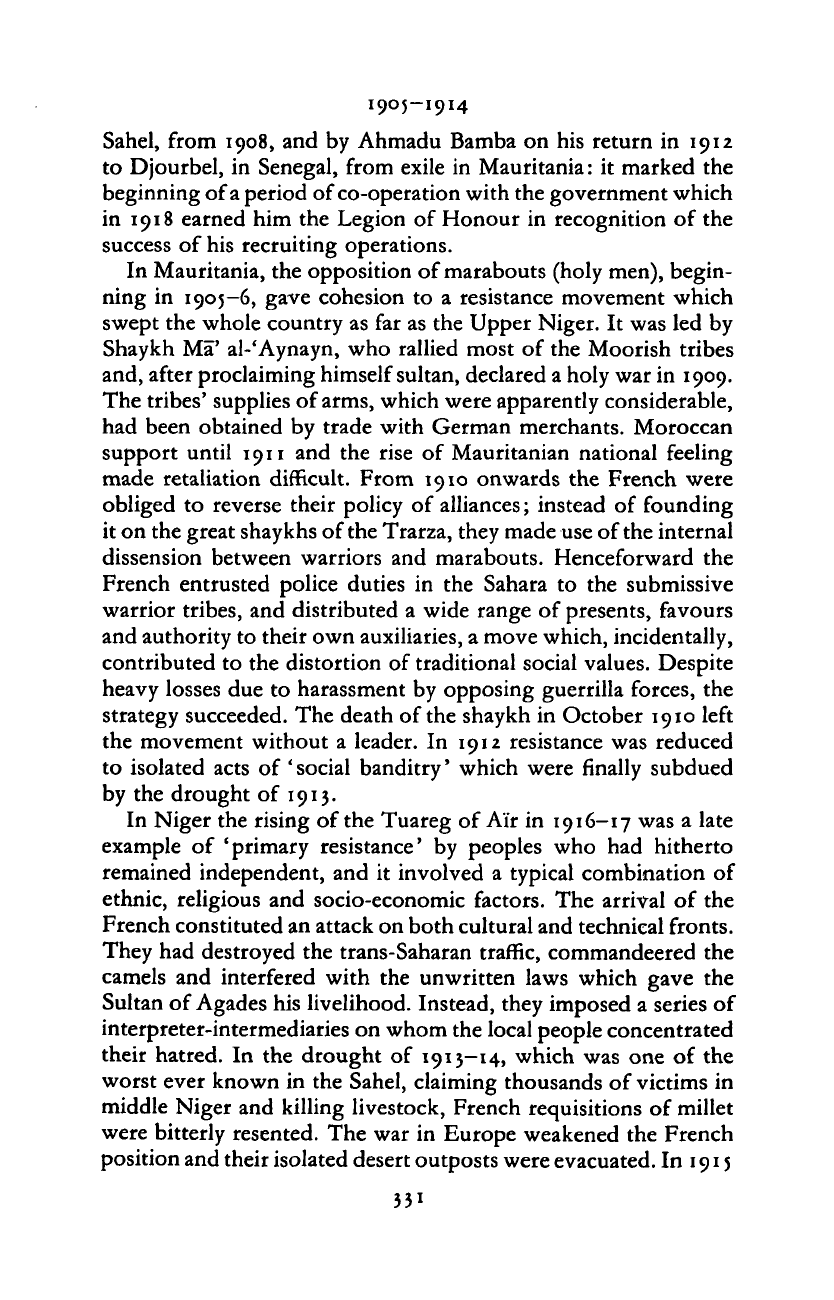
1905-1914
Sahel, from 1908, and by Ahmadu Bamba on his return in 1912
to Djourbel, in Senegal, from exile in Mauritania: it marked the
beginning of
a
period of co-operation with the government which
in 1918 earned him the Legion of Honour in recognition of the
success of his recruiting operations.
In Mauritania, the opposition of marabouts (holy men), begin-
ning in 1905-6, gave cohesion to a resistance movement which
swept the whole country as far as the Upper Niger. It was led by
Shaykh Ma' al-'Aynayn, who rallied most of the Moorish tribes
and, after proclaiming himself sultan, declared a holy war in 1909.
The tribes' supplies of
arms,
which were apparently considerable,
had been obtained by trade with German merchants. Moroccan
support until 1911 and the rise of Mauritanian national feeling
made retaliation difficult. From 1910 onwards the French were
obliged to reverse their policy of alliances; instead of founding
it on the great shaykhs of the Trarza, they made use of the internal
dissension between warriors and marabouts. Henceforward the
French entrusted police duties in the Sahara to the submissive
warrior tribes, and distributed a wide range of presents, favours
and authority to their own auxiliaries, a move which, incidentally,
contributed to the distortion of traditional social values. Despite
heavy losses due to harassment by opposing guerrilla forces, the
strategy succeeded. The death of the shaykh in October 1910 left
the movement without a leader. In 1912 resistance was reduced
to isolated acts of ' social banditry' which were finally subdued
by the drought of 1913.
In Niger the rising of the Tuareg of Air in 1916-17 was a late
example of 'primary resistance' by peoples who had hitherto
remained independent, and it involved a typical combination of
ethnic, religious and socio-economic factors. The arrival of the
French constituted an attack on both cultural and technical fronts.
They had destroyed the trans-Saharan traffic, commandeered the
camels and interfered with the unwritten laws which gave the
Sultan of Agades his livelihood. Instead, they imposed a series of
interpreter-intermediaries on whom the local people concentrated
their hatred. In the drought of 1913-14, which was one of the
worst ever known in the Sahel, claiming thousands of victims in
middle Niger and killing livestock, French requisitions of millet
were bitterly resented. The war in Europe weakened the French
position and their isolated desert outposts were evacuated. In 1915
33*
Cambridge Histories Online © Cambridge University Press, 2008
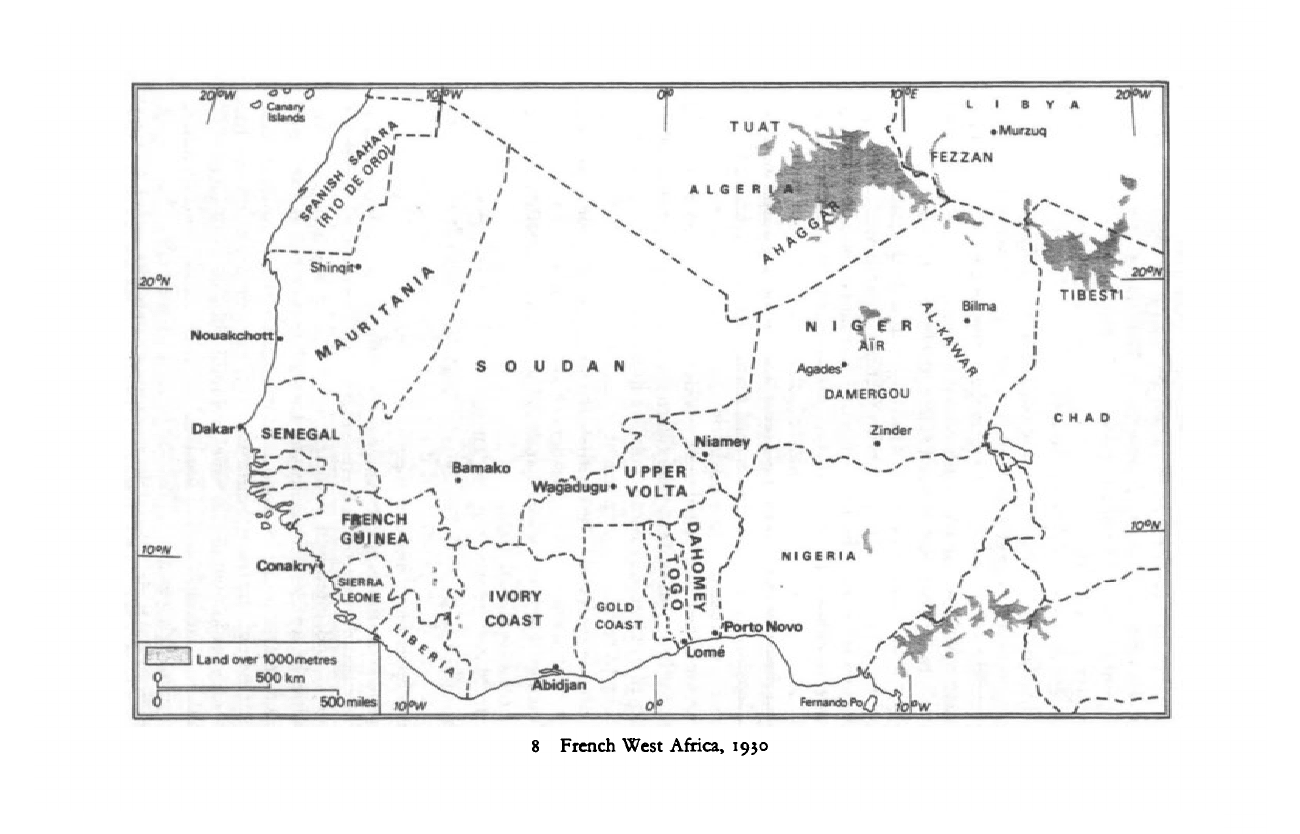
20j<>W
O Canary
blinds
20°N
20»N
10°N
- —^ v Bilma
",
N
i <%e
R
^
AIR
\
1Q0N
1
Land over KXX)metres
500 km
500miles
lOpw
8 French West Africa, 1950
Cambridge Histories Online © Cambridge University Press, 2008
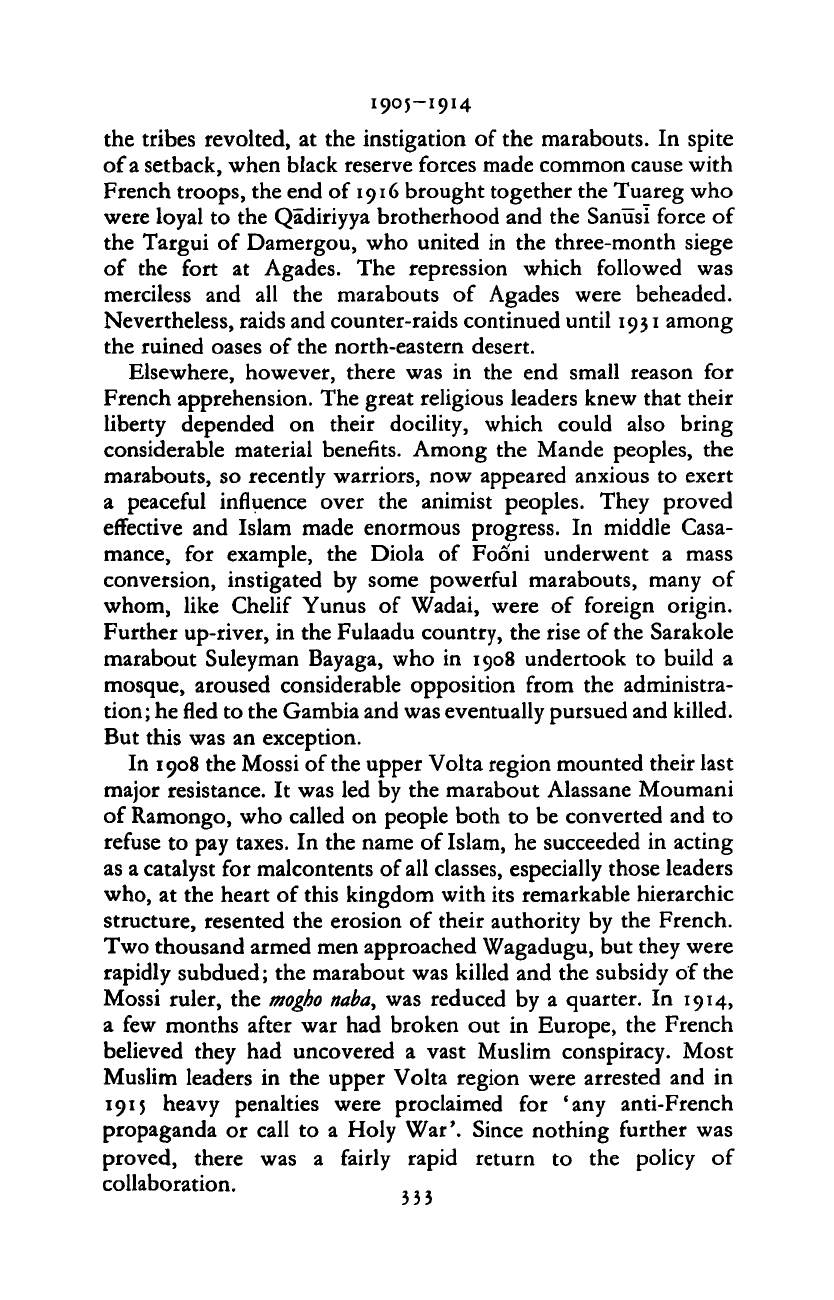
1905-1914
the tribes revolted, at the instigation of the marabouts. In spite
of a setback, when black reserve forces made common cause with
French troops, the end of 1916 brought together the Tuareg who
were loyal to the Qadiriyya brotherhood and the Sanusi force of
the Targui of Damergou, who united in the three-month siege
of the fort at Agades. The repression which followed was
merciless and all the marabouts of Agades were beheaded.
Nevertheless, raids and counter-raids continued until 1931 among
the ruined oases of the north-eastern desert.
Elsewhere, however, there was in the end small reason for
French apprehension. The great religious leaders knew that their
liberty depended on their docility, which could also bring
considerable material benefits. Among the Mande peoples, the
marabouts, so recently warriors, now appeared anxious to exert
a peaceful influence over the animist peoples. They proved
effective and Islam made enormous progress. In middle Casa-
mance, for example, the Diola of Fooni underwent a mass
conversion, instigated by some powerful marabouts, many of
whom, like Chelif Yunus of Wadai, were of foreign origin.
Further up-river, in the Fulaadu country, the rise of the Sarakole
marabout Suleyman Bayaga, who in 1908 undertook to build a
mosque, aroused considerable opposition from the administra-
tion; he fled to the Gambia and was eventually pursued and killed.
But this was an exception.
In 1908 the Mossi of the upper Volta region mounted their last
major resistance. It was led by the marabout Alassane Moumani
of Ramongo, who called on people both to be converted and to
refuse to pay taxes. In the name of Islam, he succeeded in acting
as a catalyst for malcontents of
all
classes, especially those leaders
who,
at the heart of this kingdom with its remarkable hierarchic
structure, resented the erosion of their authority by the French.
Two thousand armed men approached Wagadugu, but they were
rapidly subdued; the marabout was killed and the subsidy of the
Mossi ruler, the
mogho
naba,
was reduced by a quarter. In 1914,
a few months after war had broken out in Europe, the French
believed they had uncovered a vast Muslim conspiracy. Most
Muslim leaders in the upper Volta region were arrested and in
1915 heavy penalties were proclaimed for 'any anti-French
propaganda or call to a Holy War'. Since nothing further was
proved, there was a fairly rapid return to the policy of
collaboration.
Cambridge Histories Online © Cambridge University Press, 2008
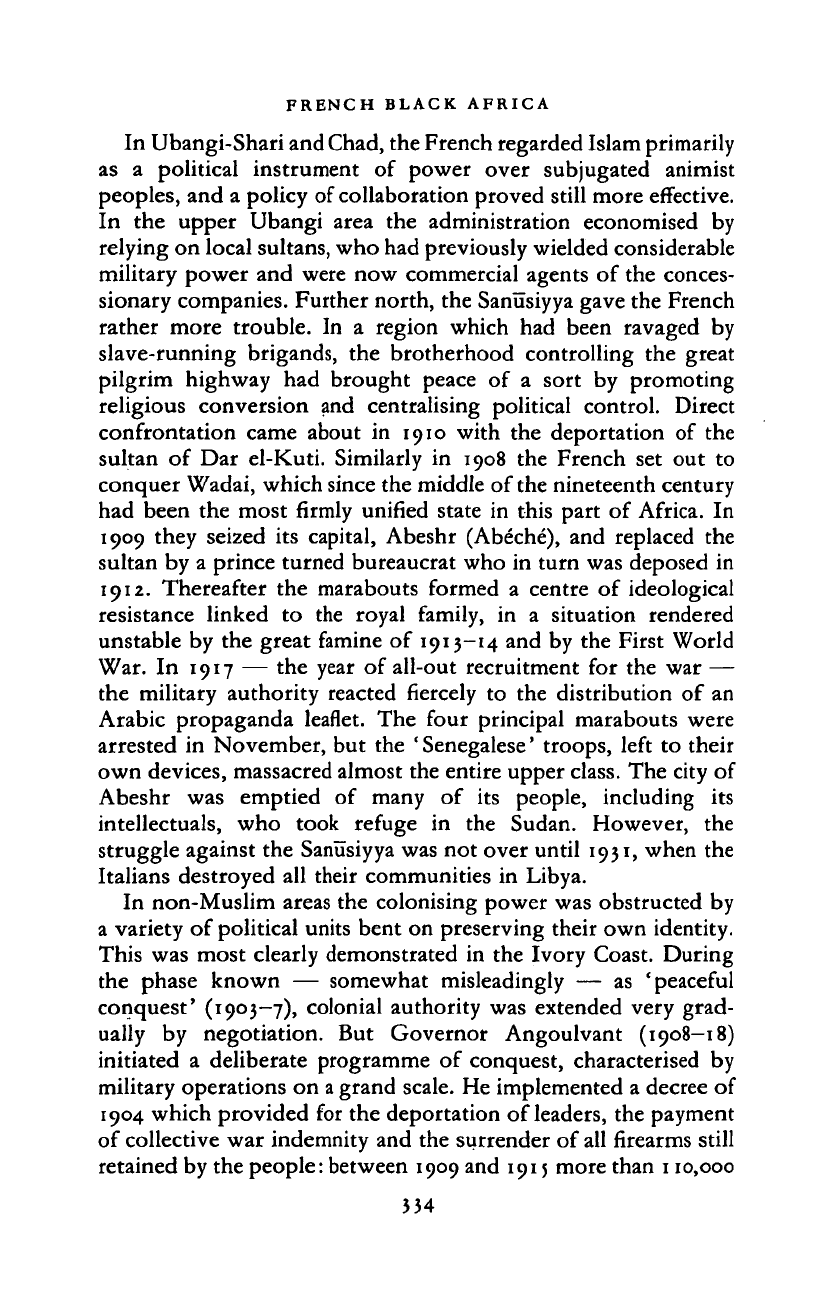
FRENCH BLACK AFRICA
In Ubangi-Shari and Chad, the French regarded Islam primarily
as a political instrument of power over subjugated animist
peoples, and a policy of collaboration proved still more effective.
In the upper Ubangi area the administration economised by
relying on local sultans, who had previously wielded considerable
military power and were now commercial agents of the conces-
sionary companies. Further north, the Sanusiyya gave the French
rather more trouble. In a region which had been ravaged by
slave-running brigands, the brotherhood controlling the great
pilgrim highway had brought peace of a sort by promoting
religious conversion and centralising political control. Direct
confrontation came about in 1910 with the deportation of the
sultan of Dar el-Kuti. Similarly in 1908 the French set out to
conquer Wadai, which since the middle of the nineteenth century
had been the most firmly unified state in this part of Africa. In
1909 they seized its capital, Abeshr (Abeche), and replaced the
sultan by a prince turned bureaucrat who in turn was deposed in
1912.
Thereafter the marabouts formed a centre of ideological
resistance linked to the royal family, in a situation rendered
unstable by the great famine of 1913-14 and by the First World
War. In 1917 — the year of all-out recruitment for the war —
the military authority reacted fiercely to the distribution of an
Arabic propaganda leaflet. The four principal marabouts were
arrested in November, but the 'Senegalese' troops, left to their
own devices, massacred almost the entire upper class. The city of
Abeshr was emptied of many of its people, including its
intellectuals, who took refuge in the Sudan. However, the
struggle against the Sanusiyya was not over until 1931, when the
Italians destroyed all their communities in Libya.
In non-Muslim areas the colonising power was obstructed by
a variety of political units bent on preserving their own identity.
This was most clearly demonstrated in the Ivory Coast. During
the phase known — somewhat misleadingly — as 'peaceful
conquest' (1903-7), colonial authority was extended very grad-
ually by negotiation. But Governor Angoulvant (1908—18)
initiated a deliberate programme of conquest, characterised by
military operations on
a
grand scale. He implemented a decree of
1904 which provided for the deportation of
leaders,
the payment
of collective war indemnity and the surrender of all firearms still
retained by the people: between 1909 and 1915 more than 110,000
334
Cambridge Histories Online © Cambridge University Press, 2008
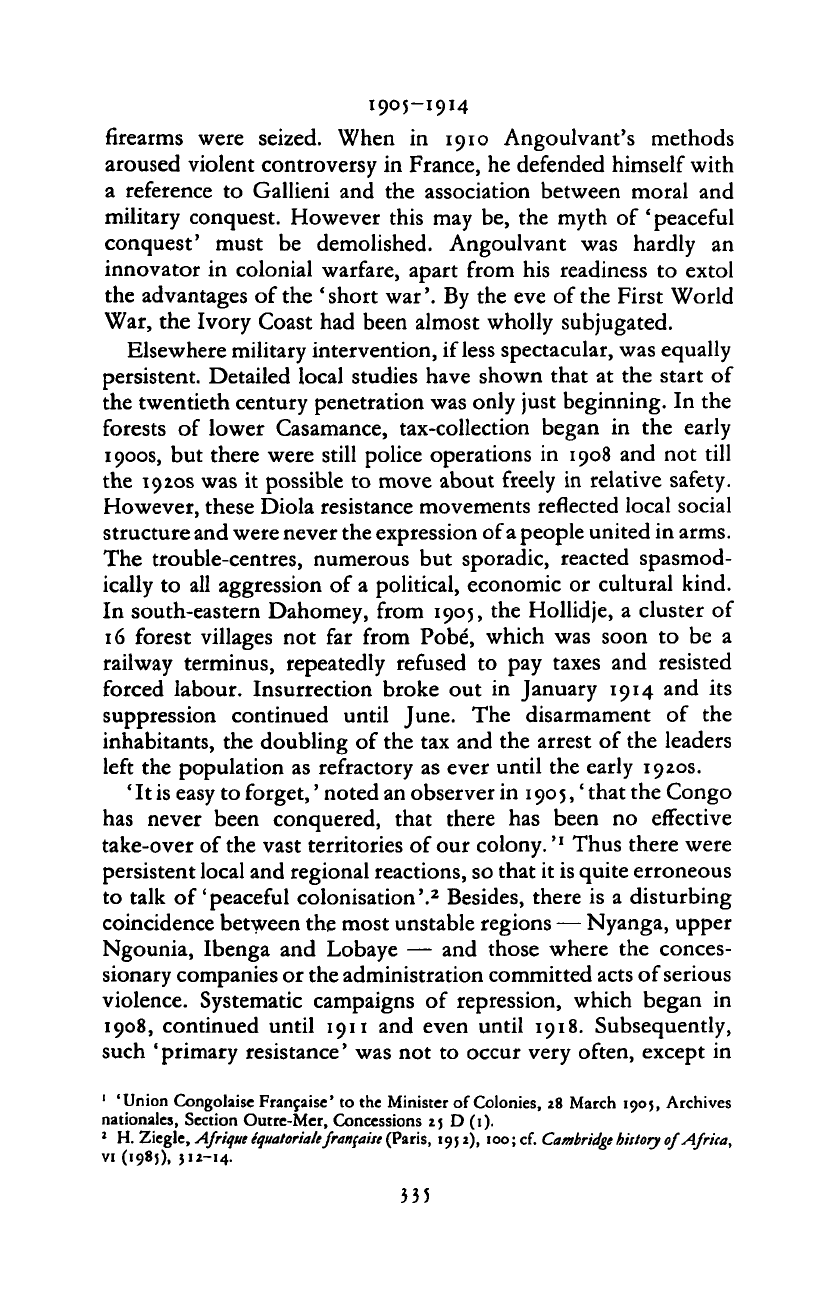
1905-1914
firearms were seized. When in 1910 Angoulvant's methods
aroused violent controversy in France, he defended himself with
a reference to Gallieni and the association between moral and
military conquest. However this may be, the myth of 'peaceful
conquest' must be demolished. Angoulvant was hardly an
innovator in colonial warfare, apart from his readiness to extol
the advantages of the 'short war'. By the eve of the First World
War, the Ivory Coast had been almost wholly subjugated.
Elsewhere military intervention, if less spectacular, was equally
persistent. Detailed local studies have shown that at the start of
the twentieth century penetration was only just beginning. In the
forests of lower Casamance, tax-collection began in the early
1900s, but there were still police operations in 1908 and not till
the 1920s was it possible to move about freely in relative safety.
However, these Diola resistance movements reflected local social
structure and were never the expression of
a
people united in arms.
The trouble-centres, numerous but sporadic, reacted spasmod-
ically to all aggression of a political, economic or cultural kind.
In south-eastern Dahomey, from 1905, the Hollidje, a cluster of
16 forest villages not far from Pobe, which was soon to be a
railway terminus, repeatedly refused to pay taxes and resisted
forced labour. Insurrection broke out in January 1914 and its
suppression continued until June. The disarmament of the
inhabitants, the doubling of the tax and the arrest of the leaders
left the population as refractory as ever until the early 1920s.
' It
is
easy to forget,' noted an observer in 190
5,'
that the Congo
has never been conquered, that there has been no effective
take-over of the vast territories of our colony.'
1
Thus there were
persistent local and regional reactions, so that it is quite erroneous
to talk of'peaceful colonisation'.
2
Besides, there is a disturbing
coincidence between the most unstable regions — Nyanga, upper
Ngounia, Ibenga and Lobaye — and those where the conces-
sionary companies or the administration committed acts of serious
violence. Systematic campaigns of repression, which began in
1908,
continued until 1911 and even until 1918. Subsequently,
such
'
primary resistance' was not to occur very often, except in
1
'Union Congolaisc Franchise' to the Minister of Colonies, 28 March 1905, Archives
rationales, Section Outre-Mer, Concessions 25 D (1).
2
H. Ziegle, Afrique iquatoriale
fran^aise
(Paris, 1952),
ioo;cf.
Cambridge
history of Africa,
vi (1985), 3ii-"4-
335
Cambridge Histories Online © Cambridge University Press, 2008
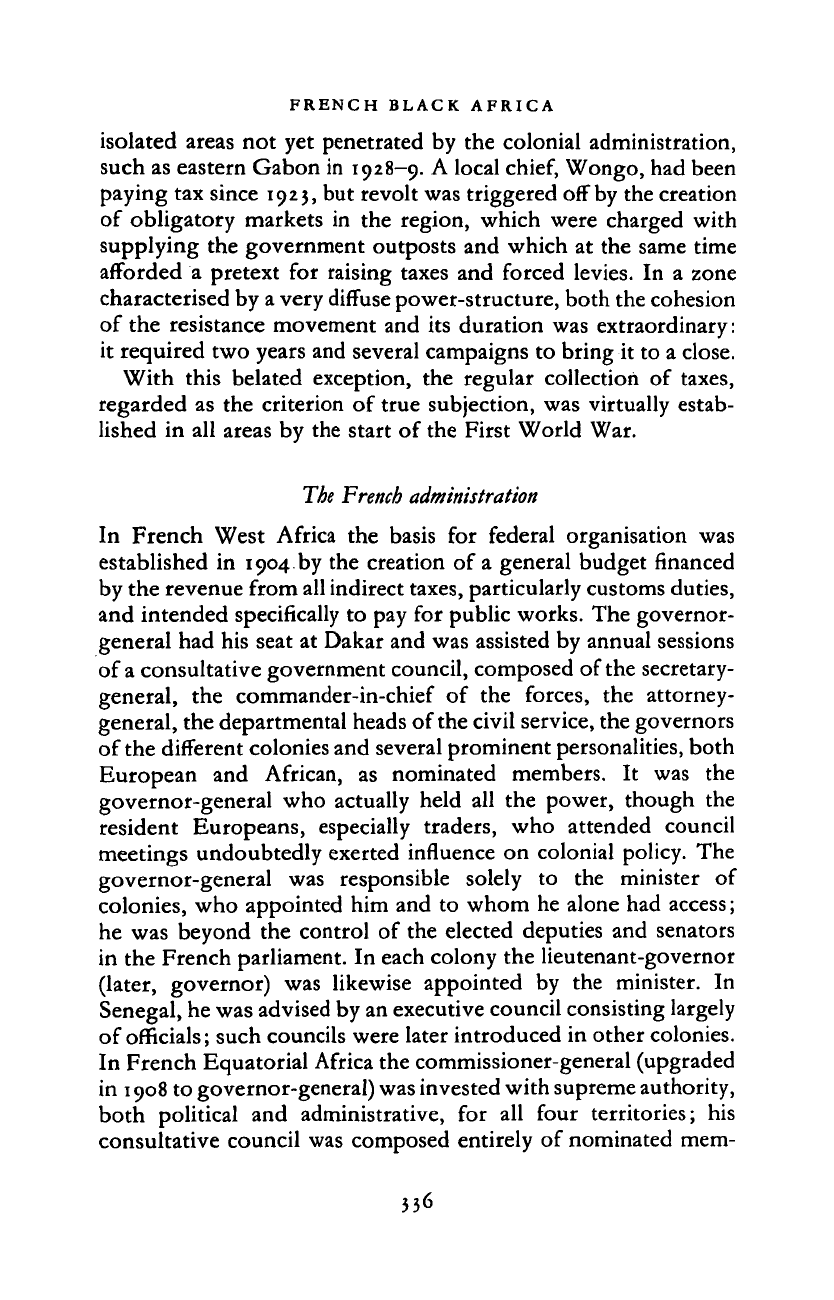
FRENCH BLACK AFRICA
isolated areas not yet penetrated by the colonial administration,
such as eastern Gabon in 1928-9. A local
chief,
Wongo, had been
paying tax since 1923, but revolt was triggered off
by
the creation
of obligatory markets in the region, which were charged with
supplying the government outposts and which at the same time
afforded a pretext for raising taxes and forced levies. In a zone
characterised by a very diffuse power-structure, both the cohesion
of the resistance movement and its duration was extraordinary:
it required two years and several campaigns to bring it to a close.
With this belated exception, the regular collection of taxes,
regarded as the criterion of true subjection, was virtually estab-
lished in all areas by the start of the First World War.
The French administration
In French West Africa the basis for federal organisation was
established in 1904 by the creation of a general budget financed
by the revenue from all indirect taxes, particularly customs duties,
and intended specifically to pay for public works. The governor-
general had his seat at Dakar and was assisted by annual sessions
of
a
consultative government council, composed of the secretary-
general, the commander-in-chief of the forces, the attorney-
general, the departmental heads of the civil service, the governors
of the different colonies and several prominent personalities, both
European and African, as nominated members. It was the
governor-general who actually held all the power, though the
resident Europeans, especially traders, who attended council
meetings undoubtedly exerted influence on colonial policy. The
governor-general was responsible solely to the minister of
colonies, who appointed him and to whom he alone had access;
he was beyond the control of the elected deputies and senators
in the French parliament. In each colony the lieutenant-governor
(later, governor) was likewise appointed by the minister. In
Senegal, he was advised by an executive council consisting largely
of officials; such councils were later introduced in other colonies.
In French Equatorial Africa the commissioner-general (upgraded
in 1908 to governor-general) was invested with supreme authority,
both political and administrative, for all four territories; his
consultative council was composed entirely of nominated mem-
336
Cambridge Histories Online © Cambridge University Press, 2008
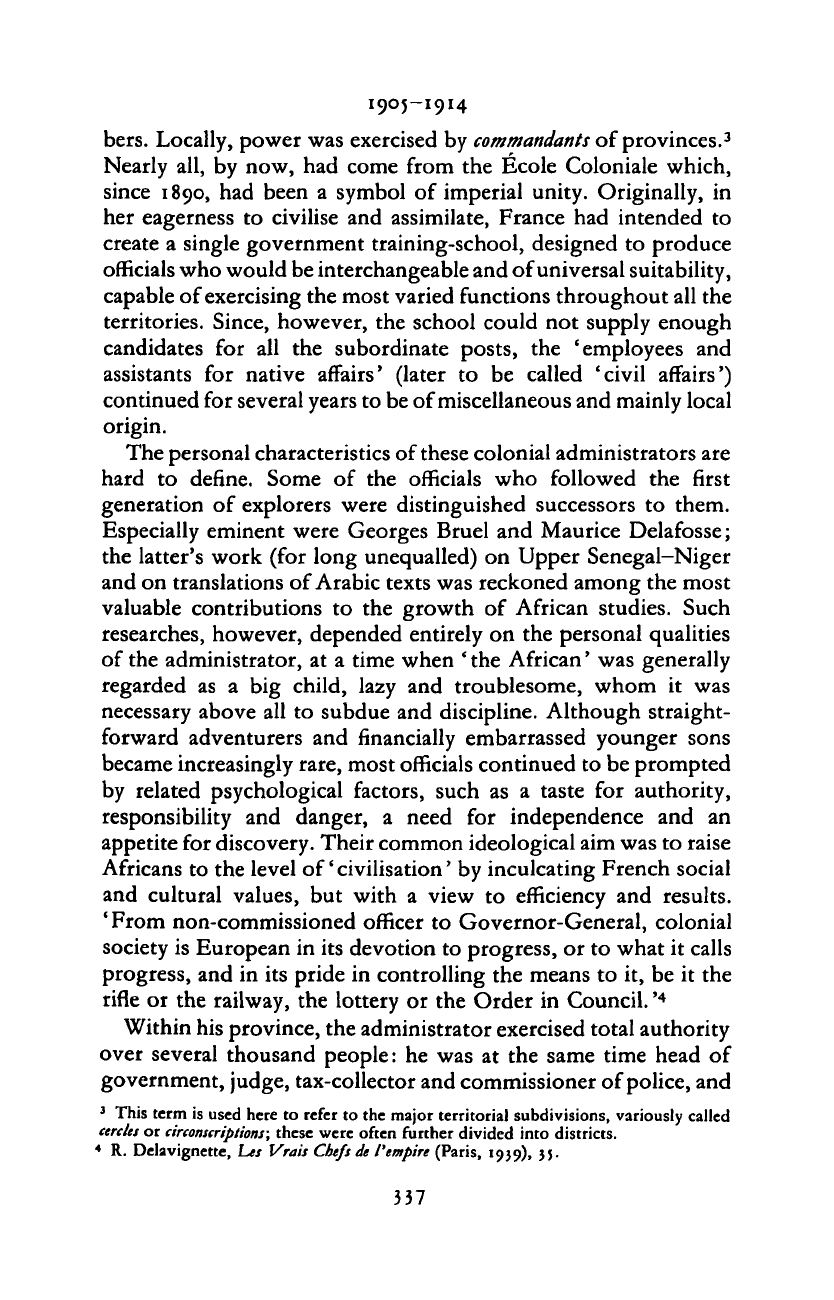
r
1905-1914
bers.
Locally, power was exercised by
commandants
of provinces.
3
Nearly all, by now, had come from the Ecole Coloniale which,
since 1890, had been a symbol of imperial unity. Originally, in
her eagerness to civilise and assimilate, France had intended to
create a single government training-school, designed to produce
officials who would be interchangeable and of universal suitability,
capable of exercising the most varied functions throughout all the
territories. Since, however, the school could not supply enough
candidates for all the subordinate posts, the 'employees and
assistants for native affairs' (later to be called 'civil affairs')
continued for several years to be of miscellaneous and mainly local
origin.
The personal characteristics of these colonial administrators are
hard to define. Some of the officials who followed the first
generation of explorers were distinguished successors to them.
Especially eminent were Georges Bruel and Maurice Delafosse;
the latter's work (for long unequalled) on Upper Senegal-Niger
and on translations of Arabic texts was reckoned among the most
valuable contributions to the growth of African studies. Such
researches, however, depended entirely on the personal qualities
of the administrator, at a time when ' the African' was generally
regarded as a big child, lazy and troublesome, whom it was
necessary above all to subdue and discipline. Although straight-
forward adventurers and financially embarrassed younger sons
became increasingly rare, most officials continued to be prompted
by related psychological factors, such as a taste for authority,
responsibility and danger, a need for independence and an
appetite for discovery. Their common ideological aim was to raise
Africans to the level of' civilisation' by inculcating French social
and cultural values, but with a view to efficiency and results.
'From non-commissioned officer to Governor-General, colonial
society is European in its devotion to progress, or to what it calls
progress, and in its pride in controlling the means to it, be it the
rifle or the railway, the lottery or the Order in Council. '
4
Within his province, the administrator exercised total authority
over several thousand people: he was at the same time head of
government, judge, tax-collector and commissioner of police, and
3
This term is used here to refer to the major territorial subdivisions, variously called
cercles
or
circonscriptions;
these were often further divided into districts.
4
R. Delavignette, Les Vrais Chefs de /'empire (Paris, 19J9), 55.
357
Cambridge Histories Online © Cambridge University Press, 2008
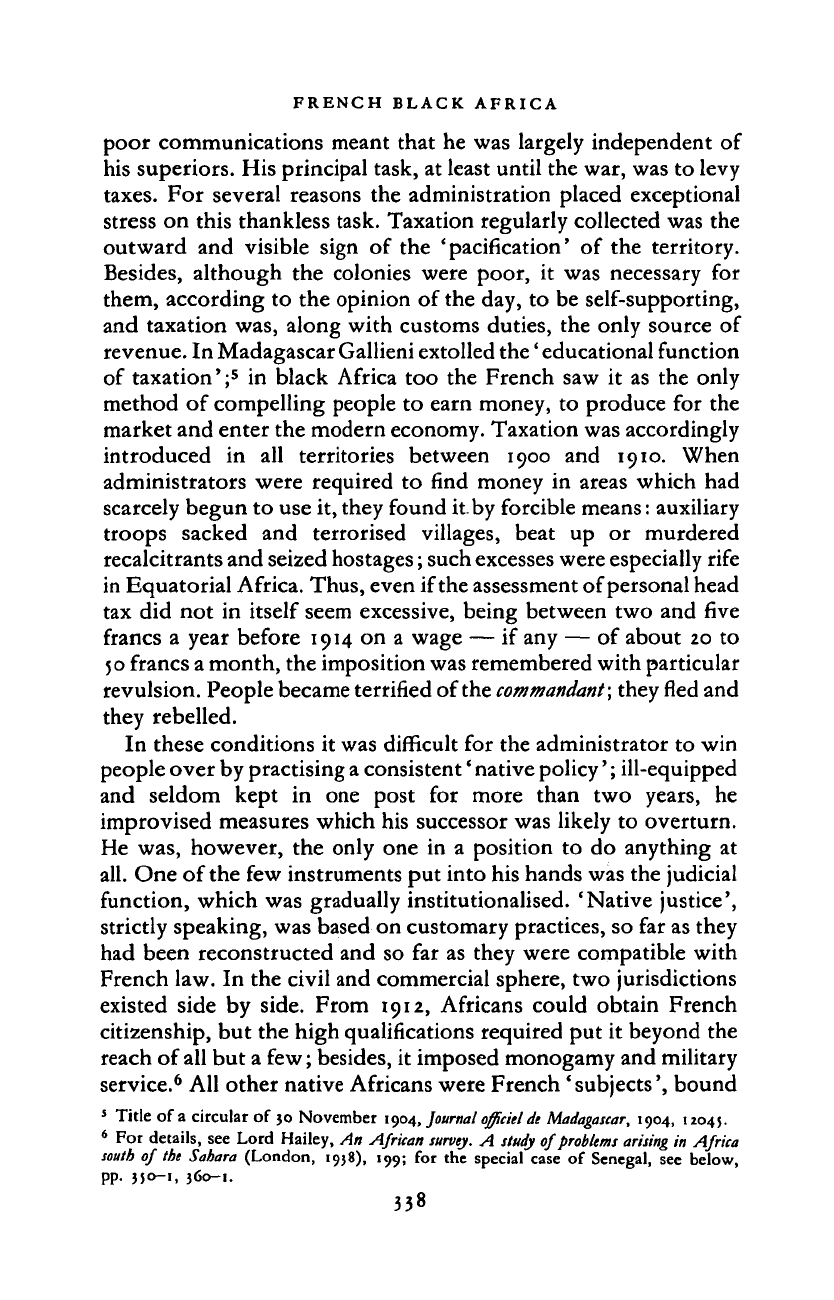
FRENCH BLACK AFRICA
poor communications meant that he was largely independent of
his superiors. His principal task, at least until the war, was to levy
taxes.
For several reasons the administration placed exceptional
stress on this thankless task. Taxation regularly collected was the
outward
and
visible sign
of
the 'pacification'
of
the territory.
Besides, although
the
colonies were poor,
it
was necessary
for
them, according to the opinion of the day, to be self-supporting,
and taxation was, along with customs duties, the only source of
revenue. In Madagascar Gallieni extolled the' educational function
of taxation'
;
s
in
black Africa too the French saw
it
as the only
method of compelling people to earn money, to produce for the
market and enter the modern economy. Taxation was accordingly
introduced
in all
territories between
1900 and
1910. When
administrators were required
to
find money
in
areas which had
scarcely begun to use it, they found it. by forcible means: auxiliary
troops sacked
and
terrorised villages, beat
up or
murdered
recalcitrants and seized hostages; such excesses were especially rife
in Equatorial Africa. Thus, even if the assessment of personal head
tax did not
in
itself seem excessive, being between two and five
francs
a
year before 1914 on
a
wage —
if
any —
of
about 20
to
50
francs a month, the imposition was remembered with particular
revulsion. People became terrified of the
commandant;
they
fled
and
they rebelled.
In these conditions it was difficult for the administrator to win
people over by practising
a
consistent' native policy'; ill-equipped
and seldom kept
in one
post
for
more than
two
years,
he
improvised measures which his successor was likely to overturn.
He was, however, the only one
in a
position
to do
anything
at
all.
One of the few instruments put into his hands was the judicial
function, which was gradually institutionalised. 'Native justice',
strictly speaking, was based on customary practices, so far as they
had been reconstructed and so far as they were compatible with
French law. In the civil and commercial sphere, two jurisdictions
existed side
by
side. From 1912, Africans could obtain French
citizenship, but the high qualifications required put
it
beyond the
reach of
all
but a few; besides, it imposed monogamy and military
service.
6
All other native Africans were French ' subjects', bound
5
Title
of
a circular
of
30 November 1904,
Journal officiel
di
Madagascar,
1904, 12045.
6
For details, see Lord Hailey,
An
African
survey.
A
study
of
problems arising
in Africa
south
of
the
Sahara (London, 1958), 199;
for the
special case
of
Senegal,
see
below,
pp.
350-1, 360-1.
338
Cambridge Histories Online © Cambridge University Press, 2008
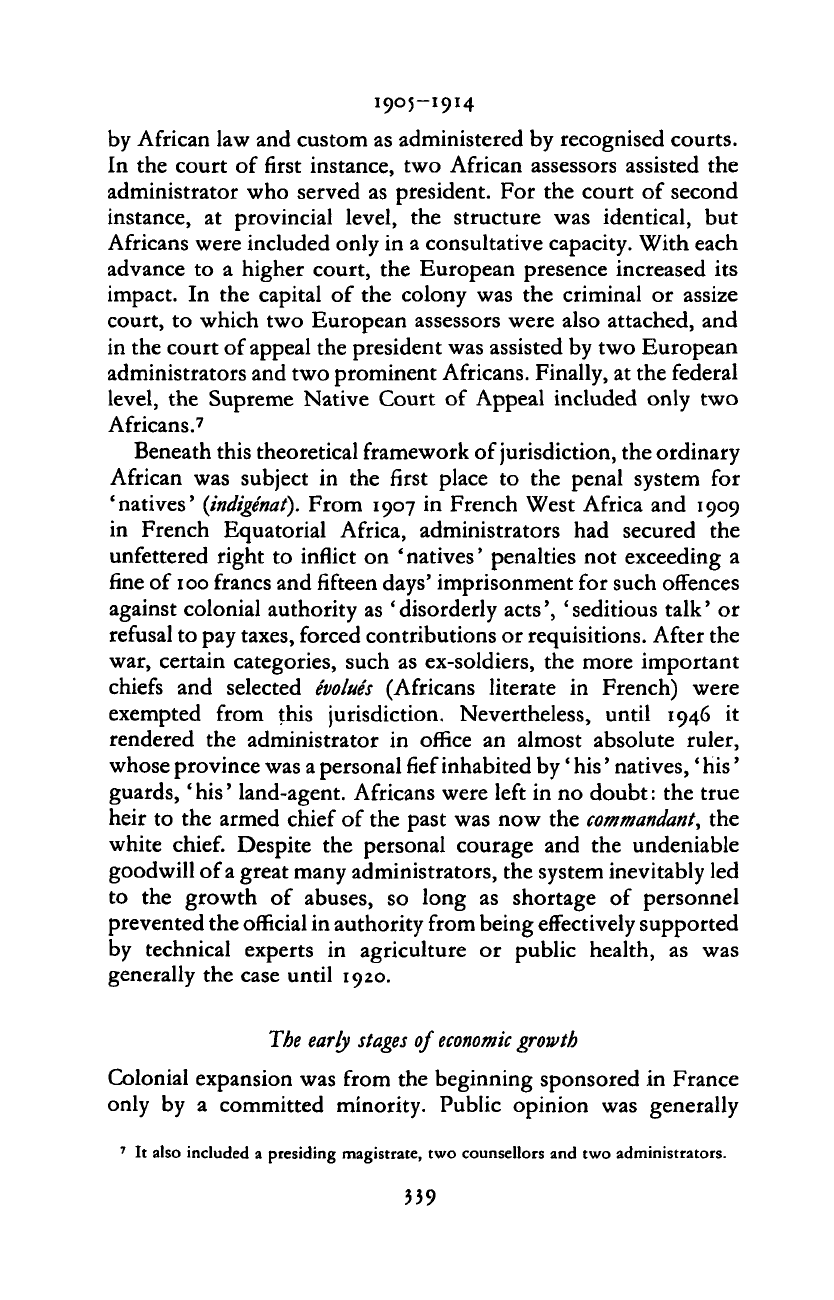
1905-1914
by African law and custom as administered by recognised courts.
In the court of first instance, two African assessors assisted the
administrator who served as president. For the court of second
instance, at provincial level, the structure was identical, but
Africans were included only in a consultative capacity. With each
advance to a higher court, the European presence increased its
impact. In the capital of the colony was the criminal or assize
court, to which two European assessors were also attached, and
in the court of appeal the president was assisted by two European
administrators and two prominent Africans. Finally, at the federal
level, the Supreme Native Court of Appeal included only two
Africans.
7
Beneath this theoretical framework of jurisdiction, the ordinary
African was subject in the first place to the penal system for
'natives'
(indigenaf).
From 1907 in French West Africa and 1909
in French Equatorial Africa, administrators had secured the
unfettered right to inflict on 'natives' penalties not exceeding a
fine of 100 francs and fifteen days' imprisonment for such offences
against colonial authority as ' disorderly acts', ' seditious talk' or
refusal to pay taxes, forced contributions or requisitions. After the
war, certain categories, such as ex-soldiers, the more important
chiefs and selected
evolues
(Africans literate in French) were
exempted from this jurisdiction. Nevertheless, until 1946 it
rendered the administrator in office an almost absolute ruler,
whose province was
a
personal
fief
inhabited by' his' natives,' his'
guards,'
his'
land-agent. Africans were left in no doubt: the true
heir to the armed chief of the past was now the
commandant,
the
white
chief.
Despite the personal courage and the undeniable
goodwill of
a
great many administrators, the system inevitably led
to the growth of abuses, so long as shortage of personnel
prevented the official in authority from being effectively supported
by technical experts in agriculture or public health, as was
generally the case until 1920.
The early
stages
of
economic
growth
Colonial expansion was from the beginning sponsored in France
only by a committed minority. Public opinion was generally
7
It also included a presiding magistrate, two counsellors and two administrators.
339
Cambridge Histories Online © Cambridge University Press, 2008
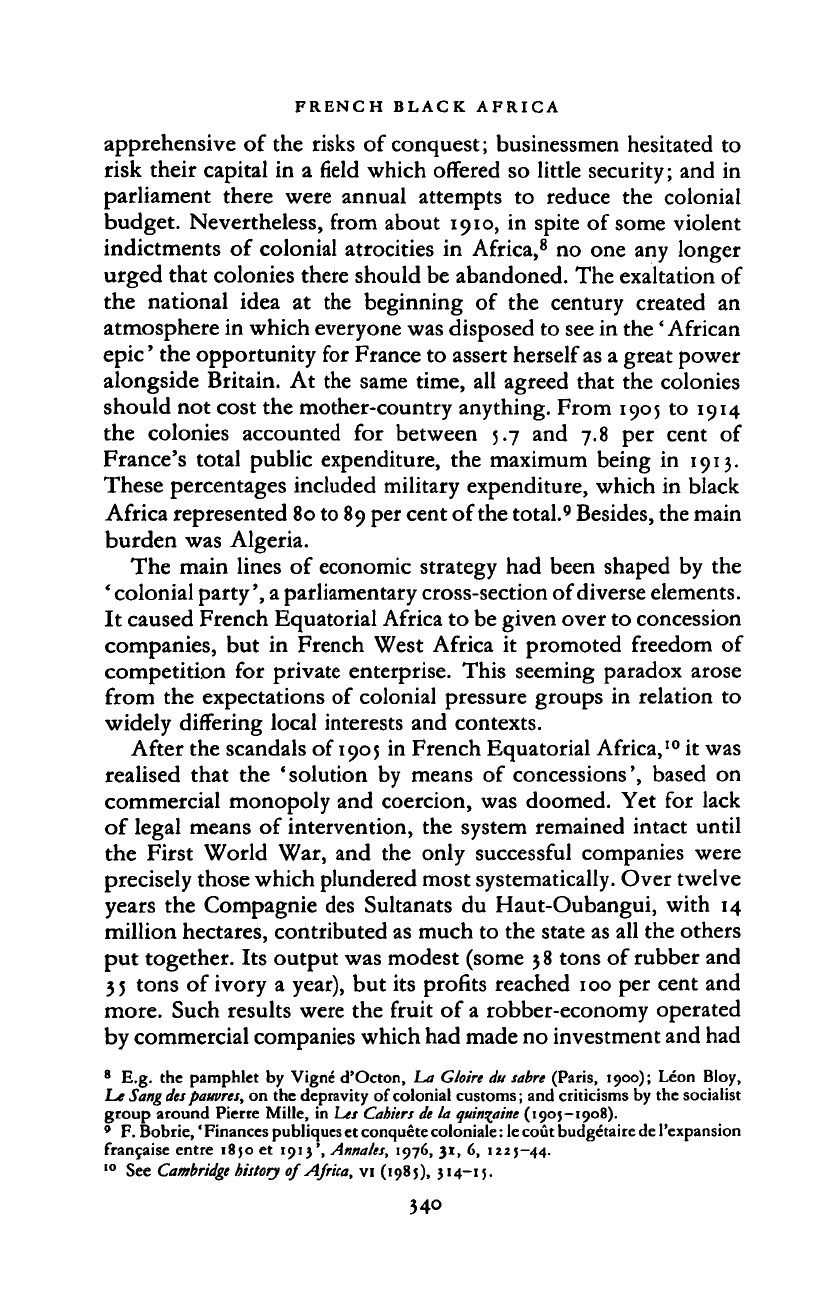
FRENCH BLACK AFRICA
apprehensive of the risks of conquest; businessmen hesitated to
risk their capital in a field which offered so little security; and in
parliament there were annual attempts to reduce the colonial
budget. Nevertheless, from about 1910, in spite of some violent
indictments of colonial atrocities in Africa,
8
no one any longer
urged that colonies there should be abandoned. The exaltation of
the national idea at the beginning of the century created an
atmosphere in which everyone was disposed to see in the
'
African
epic'
the opportunity for France to assert herself as a great power
alongside Britain. At the same time, all agreed that the colonies
should not cost the mother-country anything. From 1905 to 1914
the colonies accounted for between 5.7 and 7.8 per cent of
France's total public expenditure, the maximum being in 1913.
These percentages included military expenditure, which in black
Africa represented
80
to 89 per cent of the total.
9
Besides, the main
burden was Algeria.
The main lines of economic strategy had been shaped by the
'colonial party', a parliamentary cross-section of diverse elements.
It caused French Equatorial Africa to be given over to concession
companies, but in French West Africa it promoted freedom of
competition for private enterprise. This seeming paradox arose
from the expectations of colonial pressure groups in relation to
widely differing local interests and contexts.
After the scandals of
1905
in French Equatorial Africa,
10
it was
realised that the ' solution by means of concessions', based on
commercial monopoly and coercion, was doomed. Yet for lack
of legal means of intervention, the system remained intact until
the First World War, and the only successful companies were
precisely those which plundered most systematically. Over twelve
years the Compagnie des Sultanats du Haut-Oubangui, with 14
million hectares, contributed as much to the state as all the others
put together. Its output was modest (some 38 tons of rubber and
35 tons of ivory a year), but its profits reached 100 per cent and
more. Such results were the fruit of a robber-economy operated
by commercial companies which had made no investment and had
8
E.g. the pamphlet by Vigne d'Octon, La Gloire du sabre (Paris, 1900); Leon Bloy,
Le Sang des pauvres, on the depravity of colonial customs; and criticisms by the socialist
group around Pierre Mille, in Let Cabkrs de la
quin^aine
(1905-1908).
9
F. Bobrie,' Finances publiques et conquete coloniale: le cout budgetaire de l'expansion
franchise entre 1850 et 1913', Arma/es, 1976, 31, 6, 1225-44.
10
See Cambridge history of Africa, vi (1985), j 14-15.
340
Cambridge Histories Online © Cambridge University Press, 2008
